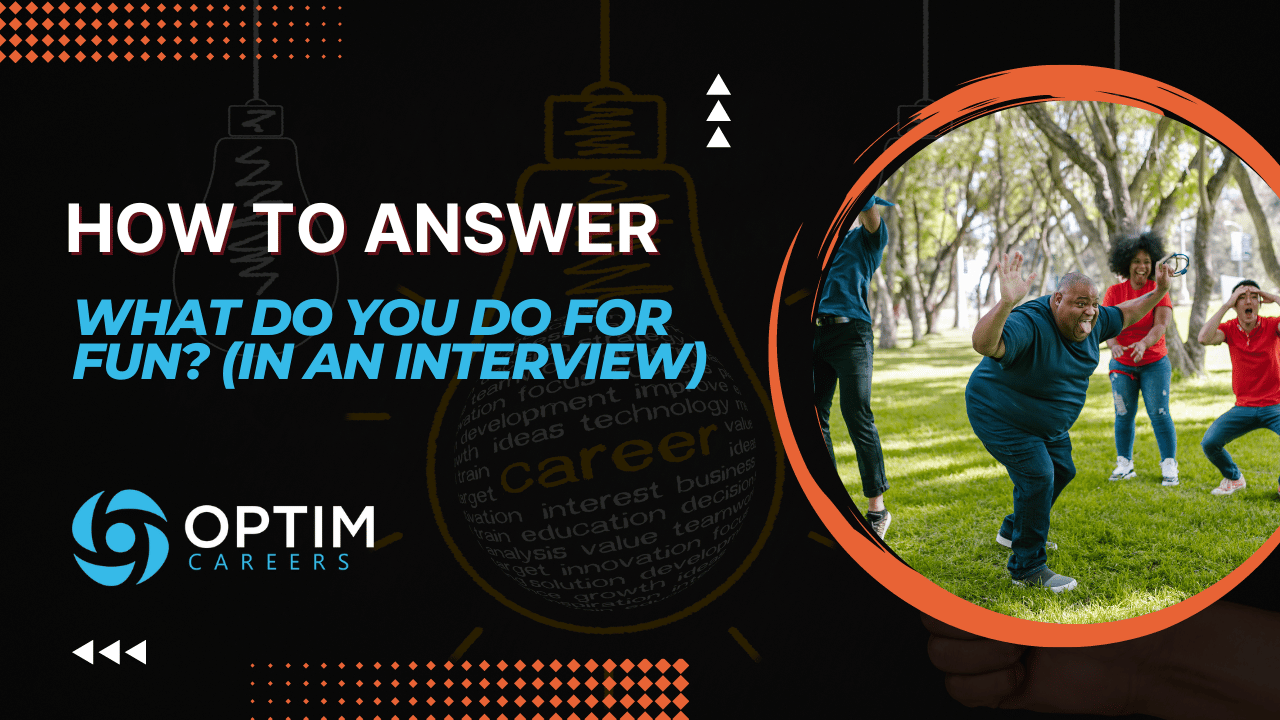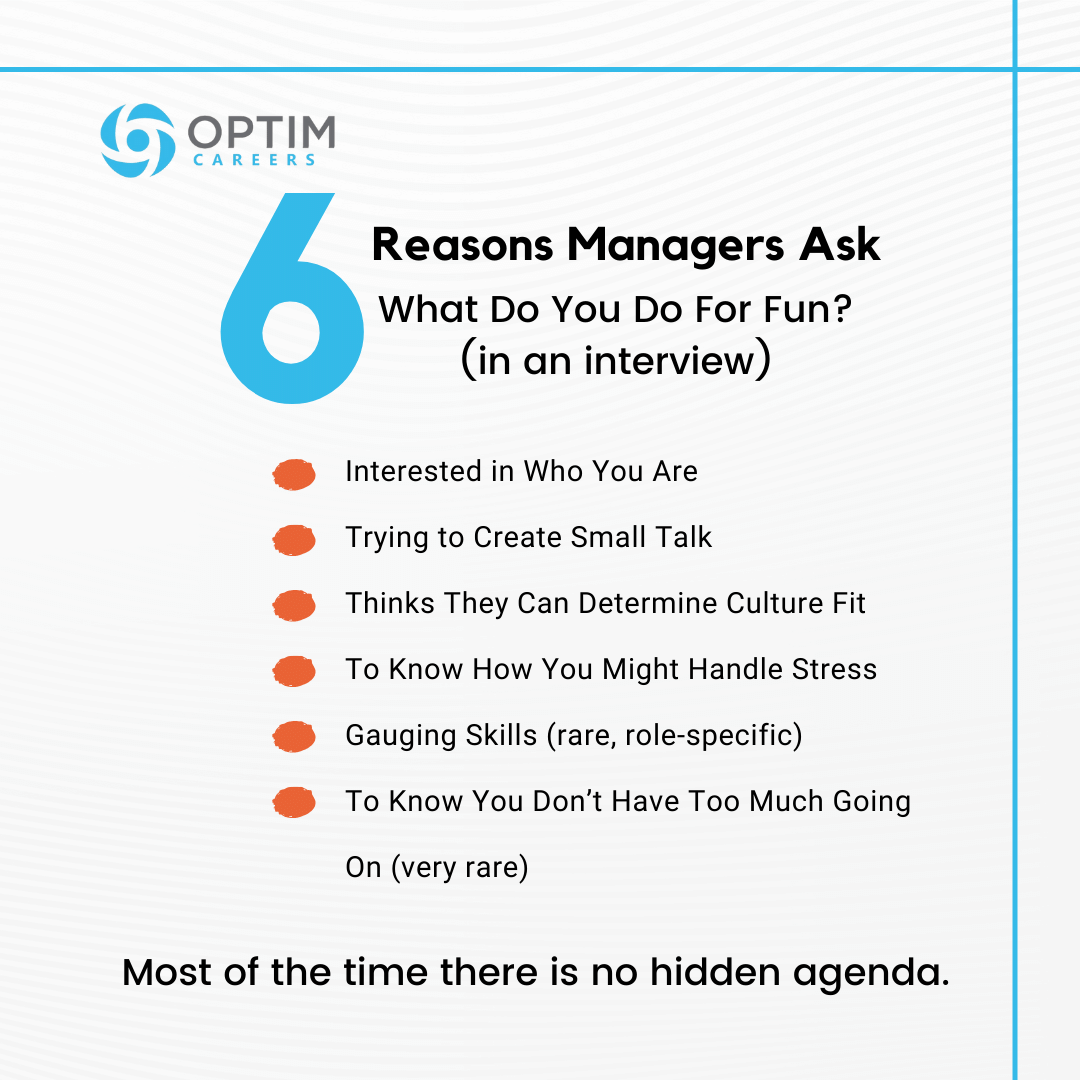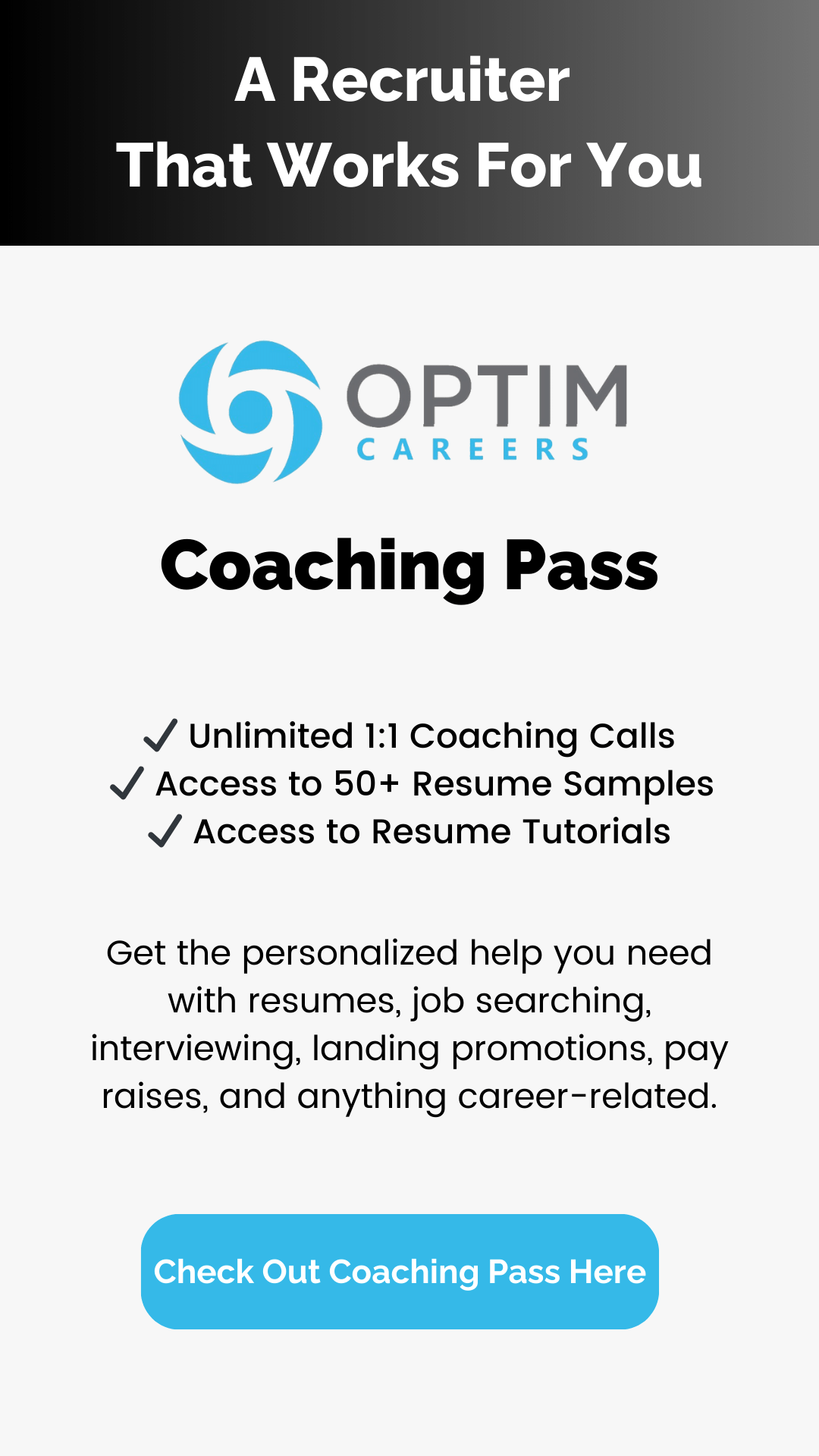Answers to “What Do You Do For Fun?” in an Interview
I wish I could say that I’ve never been asked this question before in a job interview, but I can’t. It catches you off guard. I mean, who prepares for questions like these? Unfortunately, there’s a good probability that you’ll be asked this in an interview. Perhaps the interviewers genuinely want to get to know you. Perhaps they’re using it to vet your conversation skills.
Nonetheless, it’s a common interview question that you should take a quick minute to think about.
In this article, we’ll talk about:
6 reasons hiring managers ask this question
40 sample activities to help you create your own answer
3 pieces of bad advice you’ve been given that you should forget
7 things to know about answering this question
7 example answers for this question that you can use to model your own
Understanding the Question
Before we talk about answering the question, it’s important to understand why the interviewer is asking it in the first place. As you know, I always advise people to address the underlying concerns, not the surface-level questions.
Unfortunately, there’s a lot of bad advice around this question, not surprisingly shared in articles by interview coaches trying to sell you their services. I’m not saying you shouldn’t hire an interview coach, they can be quite valuable. But this probably isn’t the question that you’re going to need to practice with them.
Now that we’ve got that off our chest, here are the reasons hiring managers may ask you this question. As you read them, keep in mind that very seldom is there some hidden objective with this question.
The Manager Wants to Know Who They’re Working With
There’s no ulterior motive here. The manager likes you and simply wants to know what you’re interested in. Most people want to know who they’ll be working with. After all, if they hire you, the two of you will be spending a lot of time together. People usually like to spend time with people they like and have similar interests.
Keep in mind that no one is going to hire you because you like baseball and they like baseball. But all things being equal, if it’s down to two candidates with the exact same abilities, it’s really hard to not think about how you and the manager both share interests.
The Manager Is Trying to Create Small Talk
This is probably the most common reason I’ve seen for managers asking this question. It’s not some hidden, I gotcha trap. They are simply trying to break the ice and make small talk to take the stress off an already stressful experience (for both of you many times).
The Manager Thinks This is How You Determine Culture Fit
I’ve got my own perceptions about the value of culture fit, but despite what you think about it, many managers use this question to assess how you’ll “fit in” with the team. I find that many times culture fit means, are you the same as everyone else.
Nonetheless, it is best to find out what you can about the company culture before you interview. Use LinkedIn, talk to people who have worked at the company, read reviews, pay attention to what the employees post online, and see what they say about themselves on their website. I’ve got an entire article about preparing for interviews if you need help.
The Manager Wants to Gauge How You Detox From Work Stress
Let’s face it, most work is stressful at times. Having a good work life balance of activities outside of work can help you work through that stress and give you much-needed breaks. Sometimes managers ask this question to gauge your balance with non-work related activities.
The Manager Wants to Know You’re Committed
While rare, I have seen this question weaponized against people. Most likely that is not what is happening to you and you shouldn’t jump to this conclusion, but you should be aware it happens. Some managers ask the question to gauge if you are involved in activities that they think may interfere with your work. Again, I’ve found this rare.
The Manager is Gauging Your Skills
In some limited cases for specific roles like sales, I have seen managers use this question to test someone’s approachability, and communication, and to see if they are simply interesting. Again, very limited cases, and for specific roles.
I had one manager ask questions like this and “What are your top 3 favorite movies?” because they thought they could gauge someone’s conversational skills which were necessary for a particular outside sales role. They want to know that you can create small talk. If you’re applying for a job like this one, this could happen to you.
What Interviewers Seek
I’ve recruited for a lot of companies over the years either directly or indirectly through my agency. One thing I can tell you is that the vast majority of the time, no one is trying to figure out how exciting you are (contrary to some coaching articles you read).
Having things in common with the manager is always a bonus perk, but I don’t know anyone who has made a hiring decision solely based on shared interests.
That being said, there are some answers you should avoid and I’ll cover those in the upcoming sections.
Other Variations of “What Do You Like To Do For Fun?” Interview Question
The interviewer may not ask the question in this exact matter. Other variations include:
What do you do in your spare time?
What do you like to do when you’re not working?
What hobbies do you have?
Choosing What You Do For Fun
Being in touch with yourself, your interests, and your values is incredibly valuable to your interview success, but also for a fulfilling life. Don’t do these exercises simply to prepare for one question, but do it for yourself and the bigger picture. Too often, many of us are so busy with life that we don’t take a beat to really think about who we are and what we want to become.
Identify Your Hobbies
The first step is simple in theory. Come up with two to three interests. They don’t have to be related, but they could be. For some, this can be difficult. Depending on your life path, you may not do much outside of work, but I would challenge you to really think about this question.
Everyone has life outside of work that happens.
Even when I was younger, broke, and spent most of my time at work and school, I still had interests and did things. I read a lot of books. Many of them were career-related (I know, I’m a special kind of weird), but I enjoyed it. I loved to learn, that was my passion. It still is to this day. Give me a good research assignment and I’m thrilled.
If you’re still having trouble getting started, here’s a list of hobbies you may do that you haven’t thought about.
40 Hobbies and Interests
Art
Baking
Board games
Chess
Climbing
Coding
Coffee tasting (yes, that’s a thing)
Collecting coins or rocks
Community activities with church, clubs, sports teams
Cooking
Crossfit
Crossword puzzles
Cycling
Fishing
Gardening
Hiking
Home improvements
Horseback riding
Learning new languages
Listening to podcasts
Movies
Music (playing or listening)
Painting
Pets and animals
Photography
Playing sports
Puzzles
Reading
Running
Sculpting
Sewing or knitting
Sudoku
Travel
Video games
Volunteer work
Watching documentaries
Wine tasting
Woodworking
Writing or blogging
Yoga
Select Relevant Activities
When I talk about relevancy, I don’t mean the interviewer has to be interested in the same thing. That can be next to impossible to know unless you’re going to stalk the interviewer for a week leading up to your interview. And no, I don’t suggest doing that.
Most people simply want to know that you have interests outside of work. Your interests could involve job-related transferable skills and if they do, prioritize those.
Here’s what I mean by relevance.
If you’re interviewing at a fertilizer manufacturer and you love gardening, mention that. It’s relevant. You probably even use some of the company’s products.
If you’re interviewing for a company that sells cabinetry and you love home improvement projects, that is relevant.
If you’re interviewing at Nike and you love running - relevant.
If you’re interviewing with a publisher and you love reading, that is very relevant.
But if you don’t have anything, that is ok too. Don’t stress about this.
Avoid Things Susceptible to Judgment
Some things are more controversial than others and have an increased likelihood of negative stigmas attached to them. You want to avoid these things. Remember, you’re not having a conversation with a friend. This is a professional setting where the two of you are evaluating whether you can help the company achieve its objectives.
Here are some things to avoid.
Don’t talk about controversial topics such as drinking or smoking.
Steer clear of anything political or religious (unless it’s relevant such as an interview with a PAC or a religious non-profit).
Avoid things that may have a stigma attached to them like video games (again unless you’re interviewing with a gaming company).
Don’t select taboo topics such as street racing or hunting.
Don’t say hanging out with friends, that’s too vague and won’t be received well. Instead, talk about what you do with those friends when hanging out.
Structuring Your Answer
Bad Advice You Can Forget
There is a lot of bad advice on the internet about structuring an answer to this question. First, let’s dispel some of that bad advice in case you’ve read it already.
First, you don’t always have to find a way to tie it back to the job you’re interviewing for. Most likely, there is some transferable skill involved that may be relevant to your job, but if all of your hobbies are unrelated, don’t try to force something that’s not there. It won’t be a good look. Remember, most of the time the manager isn’t asking this question for some hidden agenda.
Second, forget any advice you’ve read about using STAR or CAR interview methods for this question. That’s just ridiculous. Can you imagine how ridiculous you’d sound?
Interviewer trying to make small talk, “What do you like to do for fun?”
You: Well you see, this was the situation, so I decided to take action and start gardening and the result was the most beautiful heads of lettuce you’ve ever seen. I just love to plant seeds everywhere and watch them grow, just like you do in business. Plant seeds and nurture them.
Interviewer: Ok, that was awkward.
You don’t need to make it that complicated.
The last piece of bad advice is that you have to be interesting or exciting. Not everyone is looking to be impressed by your hobbies. They do want to be impressed by your skills and experiences though. If you have a hobby that makes you memorable in a good way or spurs conversation, great. But if you don’t, that’s ok.
Now that we’ve got all that off our chests, let’s dive into how to structure your answer.
Start Broad
When you discuss your interests, start broad and then read the room. It’s easy to start talking and just keep talking when you’re discussing something that interests you. Don’t do that. Read the room and if they express interest too, then let the conversation develop naturally. Then you can go into more details.
Keep it brief and if the interviewer takes it farther, then expand on the topic.
Show Motivation
I told you to keep it brief, but don’t just say that you enjoy this thing or that thing. Mention why you do it. Most of us are intrinsically motivated to pursue our interests. That’s why they’re called interests.
Intrinsic motivation is one of the biggest qualities employers look for when hiring people. External motivators like money can wear off, but if you’re intrinsically motivated by something, you’re more likely to keep doing it. And if the job shares those intrinsic motivations, you’ve hit gold.
Be Genuine
Show your enthusiasm for the topic. People love people who have passions. Keep it professional, but it’s ok to be excited about the topic.
Answer Directly
Don’t dodge the question. Few things are more frustrating to recruiters and hiring managers than candidates who don’t answer the question. Don’t be a politician, no one likes them either. Talking about things you don’t like to do rather than those you do is dodging the question and could show that you’re a bad communicator.
Don’t say you don’t have any hobbies either. Everyone is interested in something. And yes, watching baseball is a hobby.
Don’t Embellish
Don’t try to convince someone you’re interested in something because they are. Lying or exaggerating is going to backfire on you when the manager starts asking questions and you look foolish when it becomes apparent that you don’t know what you’re talking about.
Growing up, I was never that into sports but I always felt like I had to be because I was a white male. I thought that I had to keep up with football teams and the like so I could talk about them in interviews and other professional settings. Everyone else talked about these things. The truth is, you don’t and the sooner you realize these things, the better off you’ll be.
Look for Clues
Chances are you won’t be able to research what a particular interviewer is interested in, but there may be clues when you get to the interviewer. For example, if they have a signed baseball on their desk, the manager is probably interested in baseball. If that’s a shared interest of yours, mention that.
Whenever you can, find common ground. But again, don’t lie because you think it will impress them.
The important thing to remember is that this interview question is most likely NOT going to make or break your interview. There are many more important things the two of you will discuss.
Pull Them Into the Conversation
Don’t be afraid to ask a question that draws them into the conversation after you reveal your interests. Take a look at the examples below for some ideas on how to do this.
Sample Answers to “What Do You Like to Do For Fun?”
Let’s pull it all together with some sample answers. I think examples always help people think through their answers.
Example 1
One thing I enjoy and that always helps me clear my head before a good day’s work is jogging. There’s something liberating about just you and the sound of your feet hitting the pavement. I often have my best ideas as I’m running and I always feel energized afterward. What about you? What do you do when you’re not here at the office?
Example 2
I spend a lot of weekends hiking, most recently I hiked Mount Whitney. Let’s face it, this type of work requires a lot from us and there’s nothing like nature to reset the week. Do you do any hiking?
Example 3
During my free time, I like to play strategy board games with my kids. I like to try out new ideas and they always keep me on my toes. Are you a board game guy or a cards guy?
Example 4
Recently I’ve been doing stand-up comedy at the Laugh Factory. I guess I’m ok at it because they keep inviting me back. Have you ever been to the Laugh Factory? I think there’s one close to here.
Example 5
Our jobs are so go-go-go and we talk to people all day long so I like to unwind by reading a good book. Sometimes non-fiction, sometimes fiction, it just depends on my mood for the day. Have you read anything good lately?
Example 6
I love cooking and trying new recipes. One of my favorite sites lately for ideas is A Couple of Cooks. Do you cook much?
Example 7
I do a bit of volunteering at the Upskill Coalition. It’s a local non-profit that provides training for people who want to enter software engineering. I try to volunteer at least 10 hours a month. You get to meet new people and the work is rewarding. I saw that ABC Company is pretty involved with some similar programs are they not?
What Do You Do For Fun Interview Question Recommended Reading
Accountability Interview Questions and Answers
Cole Sperry has been a recruiter and resume writer since 2015, working with tens of thousands of job seekers, and hundreds of employers. Today Cole runs a boutique advisory firm consulting with dozens of recruiting firms, oversees Optim’s Resume Revision Service and On-Demand Coaching Program, and is the Managing Editor at OptimCareers.com.







![What Are You Looking For in Your Next Job [7 Example Interview Answers]](https://images.squarespace-cdn.com/content/v1/5e7a582d35406e67f528c98d/44743917-3f7b-4aa9-86a6-28a5790f7871/What+are+you+looking+for+in+your+next+job.png)

![Unique Interview Questions to Ask Employer [From Hiring Managers That Told Me They Were Impressed]](https://images.squarespace-cdn.com/content/v1/5e7a582d35406e67f528c98d/72a85b60-a00b-4551-aaaf-e4b7f6b48adb/Unique+Interview+Questions+to+Ask+Employer.png)
![Communication Skills Synonym [58 Better Ways to Say It]](https://images.squarespace-cdn.com/content/v1/5e7a582d35406e67f528c98d/2e86656b-8ac8-4dd4-82b4-48a497580b72/Communication+Skills+Synonym.png)
![Director vs Manager [Knowing the Difference Could Save You $30K]](https://images.squarespace-cdn.com/content/v1/5e7a582d35406e67f528c98d/bd05ce4d-1ccf-4527-9453-5b14abdac2db/Director+vs+Manager.png)
![Excuses to Leave Work Early [34 Excuses That Work]](https://images.squarespace-cdn.com/content/v1/5e7a582d35406e67f528c98d/98b08ad3-ac21-48f7-a254-cf9e271f6919/excuses+to+leave+work+early.png)
![32 Bulletproof Excuses to Get Out of Work [And Exactly What to Say to Your Boss]](https://images.squarespace-cdn.com/content/v1/5e7a582d35406e67f528c98d/9d064c65-348b-4409-98e4-10d11feecd58/bulletproof+excuses+to+get+out+of+work.png)

![Evidence of Excellence [Examples and Descriptions]](https://images.squarespace-cdn.com/content/v1/5e7a582d35406e67f528c98d/ac00227c-025e-4196-997f-3cfd9da51332/Evidence+of+Excellence.png)
![Looking Forward to Speaking With You [Professional or Not?]](https://images.squarespace-cdn.com/content/v1/5e7a582d35406e67f528c98d/29255430-0489-4c82-ba7b-91d262ea9922/Looking+Forward+to+Speaking+With+You.png)


![How to List Temp Jobs on Resume [5 Steps]](https://images.squarespace-cdn.com/content/v1/5e7a582d35406e67f528c98d/aff0d610-7623-4849-b072-321ef59deb7c/How+to+list+temp+jobs+on+resume.png)
A complete resume guide for dental assistants.